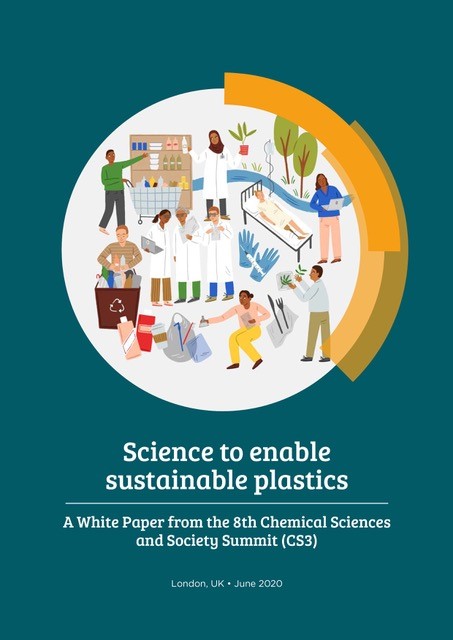We asked people across the UK about their attitudes towards plastics, recycling and sustainability. We found that whilst a majority are concerned about the environment and keen to make environmentally-responsible decisions, many were baffled by confusing labels, a lack of sustainable product choices, and limited local recycling options.
What did the survey tell us?
76%say they recycle every plastic that they can
57%agree that the COVID-19 pandemic has shown them we need to do more to protect the planet
48%say they don't always recycle single-use plastic packaging because labels on products don't make it clear whether it can or cannot be recycled
33%claim that their local authority does not have recycling services for everything that is labelled as recyclable
Informed by the results of the survey, the Royal Society of Chemistry is calling for the following:
-
Urgent focus on scientific research in four key areas around plastics: recyclability; degradation; measuring the impacts of plastics; designing new sustainable plastics. Read more.
-
Designing plastics with sustainability as a key feature. Doing so from the start could – in the long term – lead to products that are simpler and more efficient to recycle, facilitating a circular economy for plastics.
-
Improved infrastructure for processing waste plastic, in particular switching to a national strategy for recycling. This could also include introducing new infrastructure to process new, more sustainable types of plastic.
How is chemistry helping to solve the plastics problem?
Chemical scientists are working to produce more sustainable alternatives to today’s plastics. Dr Jennifer Garden from the University of Edinburgh conducts research into poly(lactic acid) (PLA), a complement to traditional plastics that can be industrially composted.
A significant problem with recycling traditional plastics is that even when they are collected and recycled properly, there is a loss in quality every time they are recycled. Poly(lactic acid), on the other hand, can be industrially composted or chemically recycled back to its constituent parts, before being remade into a new product of the same quality as the original.
Dr Garden continues: "PLA products are commercially available, but we’ll need to change infrastructure to accommodate these new types of plastics. Despite being a great option for plastics of the future, we don’t yet have the infrastructure for collecting and composting PLA products on a large scale. Chemists, product designers and local government need to start working together to ensure that these innovative solutions actually deliver on their promise."
Dr Garden explains that in future plastics need to be designed with sustainability as a main focus.
"At the moment plastics are designed purely with function in mind – whether that’s strength, flexibility, and so on. We need to start thinking of sustainability as a key necessary property of any product. If there are several materials with similar performance, we should aim to pick the most sustainable one."
What are some more possible solutions?
- Use polymers built entirely from renewable, biologically-derived feedstock chemicals, or from wastes like CO2.
- Design more durable or longer-lasting polymers, which can be reused several times.
- Design polymers to incorporate special chemical and physical features to make them safely biodegradable on demand.
- Consider how different polymers are combined to produce various products, and how this affects recyclability. For example, many of the films used in packaging are multilayered plastics made from several different polymers. The layers must be separated in order for the plastic to be recycled, which is generally not feasible. If these structures could be simplified to a single layer, these plastics could be recycled much more easily at end of life.
Progressive plastics: recent research
We've collected together some open access articles from our journals, demonstrating how chemists are working to address each of the major research challenges that must be tackled urgently if we are to achieve a more sustainable future for plastics.
Progressive plastics: explained
In a new series of explainers, we look at some of the difficult questions around the important issue of creating a sustainable future for plastics. Whether you are already a scientific expert, or you are new to this topic, you can use our handy guides to start conversations and inform yourself and those around you.
A plan for creating a circular economy for plastics
In last year’s report, Science to enable sustainable plastics, the Royal Society of Chemistry called for urgent fundamental research in the four key areas of degradation, recycling, measuring impacts of plastics, and designing new plastics – to hasten the arrival of truly sustainable plastic materials for the mass market.
Cooperation from government, industry, manufacturers and retailers will be essential in ensuring the results of this research can be implemented effectively, and that we have the necessary infrastructure in place to incorporate new, more sustainable types of plastics into a circular economy.
Related pages
- How can we make paint more sustainable?
- A task force of industry leaders are working with us to make polymers in liquid formulations more sustainable
- Chemistry can help the composites sector move towards more sustainable practices
- RSC members working with young people or public audiences can access our plastics collection of resources for engagement and outreach ideas
RSC Podcast coming soon: focus on plastics
We're launching a brand new podcast entitled 'Brought to you by Chemistry', bringing together experts from science, politics, industry and beyond, to explore some of the biggest challenges we all face today.
The first series is a deep-dive into plastics, tackling recycling, degradation, microplastics and more.
You'll be able to access the episodes on our website or wherever you get your podcasts from 1 September 2021.


